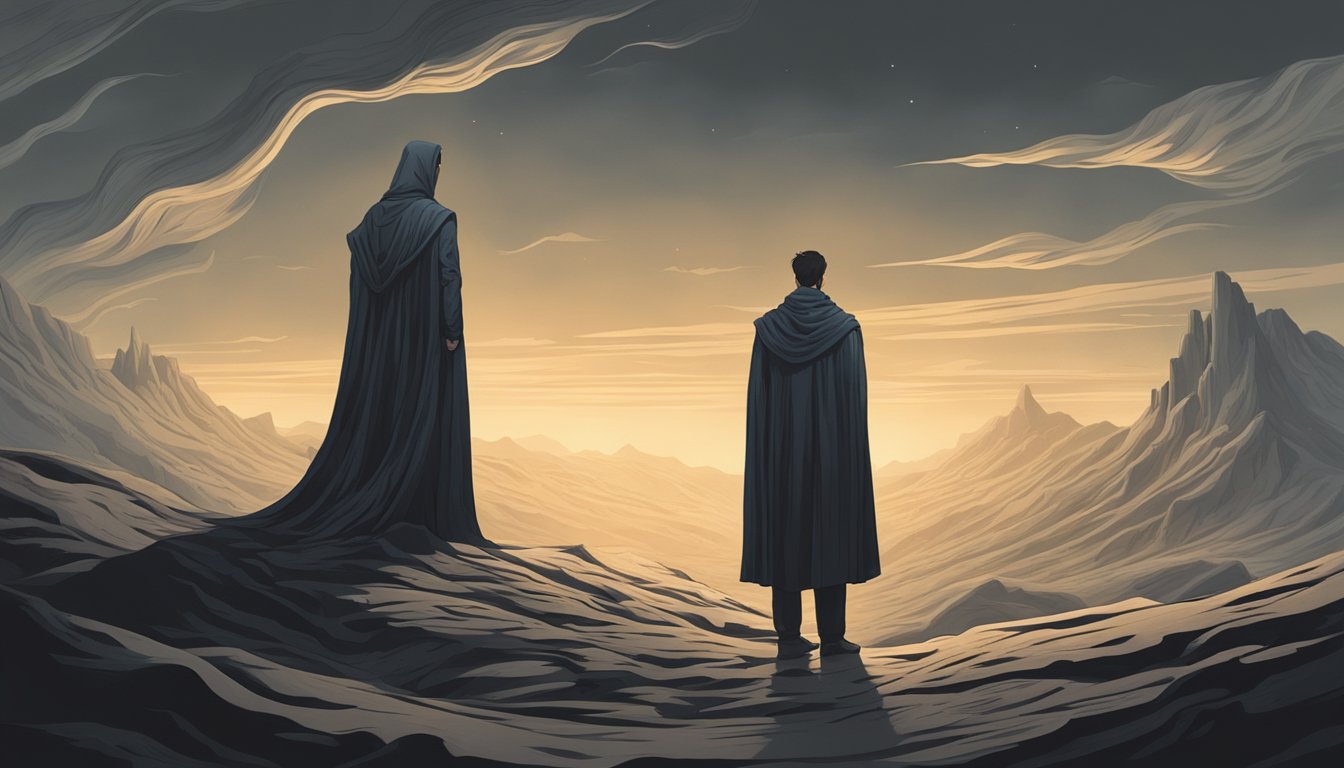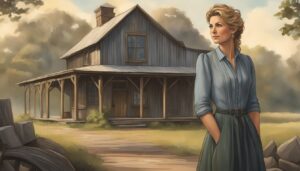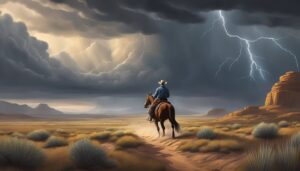Shea Brennan, a central figure in Paramount+’s “1883,” embodies the quintessential Western hero haunted by his past. As a 75-year-old Civil War veteran and guide for the Dutton family’s westward journey, Brennan’s character depth stems from personal tragedy. His role as the no-nonsense leader of a settler caravan traveling from Texas to Oregon is shaped by the loss of his family to smallpox, a devastating event that drives his inner turmoil throughout the series.
The series premiere of “1883” introduces viewers to Brennan’s grief in a powerful opening scene. This moment sets the tone for his character arc, one of redemption and healing amidst the harsh realities of the American frontier. Brennan’s struggle with his past while guiding others to their future creates a compelling narrative thread that runs through the heart of the show.
Shea Brennan’s character in “1883” offers a window into the psychological toll of westward expansion. His journey resonates with themes of survival, leadership, and the search for purpose in a world that has taken everything from him. As the series progresses, viewers witness Brennan’s internal battles unfold against the backdrop of the untamed West, making him a captivating figure in this Yellowstone origin story.
Shea Brennan: The Tragic Hero

Shea Brennan, the 75-year-old protagonist of “1883,” embodies the quintessential tragic hero. His complex character is shaped by a tumultuous past and deep-seated emotional scars.
Remarkable Traits of Shea Brennan
Shea Brennan’s leadership skills and resilience stand out as his most defining qualities. As a wagon boss and Pinkerton Detective, he guides settlers along the treacherous Oregon Trail with unwavering determination. His no-nonsense approach and tough exterior mask a vulnerable core, making him a multifaceted character.
Brennan’s experience as a Union Army captain equips him with the necessary skills to navigate the harsh frontier. His ability to make difficult decisions and protect those under his care showcases his strength and dedication.
Despite his gruff demeanor, Brennan demonstrates moments of compassion, particularly towards widows and orphans. This empathy stems from his own tragic experiences, adding depth to his character.
The Haunting Past of a Civil War Veteran
Shea Brennan’s participation in the American Civil War left an indelible mark on his psyche. As a Union veteran, he carries the weight of the lives he took during combat. This burden manifests in recurring nightmares that plague his sleep.
The war’s impact extends beyond his dreams, influencing his worldview and decision-making. Brennan’s comment about the frontier creating “too many widows and orphans” reflects his sensitivity to the human cost of conflict and expansion.
His military background also informs his leadership style. Brennan’s tactical knowledge and discipline prove invaluable in guiding the settler caravan through dangerous territories.
Struggles with Personal Loss
Tragedy struck Shea Brennan’s life when he lost his wife and daughter to smallpox. This devastating loss forms the core of his character’s inner turmoil. The opening scene of “1883” poignantly portrays Brennan mourning their deaths, setting the tone for his emotional journey.
The loss of his family pushes Brennan to the brink of suicide. However, he finds new purpose in leading the wagon train, channeling his grief into protecting others from similar fates.
Brennan’s personal tragedy makes him acutely aware of the dangers facing the settlers. His experience with loss drives him to be a vigilant and protective leader, determined to guide his charges safely to their destination.
Perspectives on Leadership

Shea Brennan’s leadership style in “1883” reflects his military background and personal experiences. His approach to guiding the caravan combines strict discipline with pragmatic decision-making.
Comparison with Other Leaders
Shea Brennan stands out among frontier leaders due to his unique blend of Civil War experience and Pinkerton Agency training. Unlike more impulsive or emotionally-driven leaders, Brennan maintains a stoic demeanor in the face of adversity.
His leadership style contrasts sharply with that of James Dutton, who leads primarily by example and familial bonds. Brennan’s approach is more authoritarian, reminiscent of military command structures.
Compared to other wagon train leaders of the era, Brennan shows exceptional foresight in planning and risk assessment. This sets him apart from those who might prioritize speed over safety.
Brennan’s Method of Commanding the Caravan
Shea Brennan employs a no-nonsense approach to leading the pioneer caravan. He sets clear expectations and enforces strict rules to ensure the group’s survival in the harsh frontier environment.
Brennan’s leadership is characterized by:
- Quick, decisive action in emergencies
- Fair but firm discipline
- Emphasis on collective safety over individual desires
His methods often appear harsh to the pioneers, but they prove effective in navigating the dangers of the journey. Brennan’s past experiences with loss inform his prioritization of group survival.
He delegates responsibilities wisely, relying on Thomas as his right-hand man and recognizing the strengths of other capable individuals within the caravan. This strategic distribution of duties helps maintain order and efficiency during the trek.
Character Interactions and Relationships

Shea Brennan’s complex relationships shape his journey in “1883”. His bond with Thomas provides stability, while his interactions with the Dutton family reveal his leadership and vulnerabilities.
Bond with Thomas, the Buffalo Soldier
Shea Brennan and Thomas form a strong partnership based on mutual respect and shared experiences. As fellow veterans, they understand the toll of war and loss. Thomas, a former Buffalo Soldier, complements Shea’s leadership with his own skills and wisdom.
Their relationship is marked by trust and unspoken understanding. In dangerous situations, they work seamlessly together, protecting the wagon train. Thomas often serves as a calming influence on Shea, helping him navigate his inner demons.
Despite their differences in background, Shea and Thomas find common ground in their dedication to the settlers’ safety. Their bond grows stronger as they face the challenges of the journey west.
Brennan’s Dynamics within the Dutton Family
Shea Brennan’s interactions with the Dutton family reveal different facets of his character. With James Dutton, Shea develops a relationship of mutual respect. They often consult on important decisions, with Shea valuing James’s frontier knowledge.
Shea takes on a mentorship role with Elsa Dutton. He recognizes her spirit and potential, offering guidance as she adapts to life on the trail. His protective instincts surface in his interactions with Margaret Dutton, balancing his role as leader with sensitivity to the family’s needs.
The Duttons come to rely on Shea’s experience and judgment. In turn, their presence reminds Shea of his lost family, stirring both pain and a sense of purpose in guiding them to safety.
Challenges on the Journey Westward

Shea Brennan faced numerous obstacles as he led settlers across the untamed frontier. The harsh realities of the Old West tested his resolve and leadership at every turn.
Harsh Realities of Life in the Old West
The journey west exposed travelers to unforgiving conditions. Extreme weather, from scorching heat to freezing cold, took its toll on both people and livestock. Food and water scarcity became constant concerns. Rivers proved treacherous to cross, often claiming lives and supplies.
Bandits and outlaws posed a persistent threat, forcing Shea to remain vigilant. The lack of law enforcement in these territories meant justice often fell to individuals. Settlers had to adapt quickly to survive, learning new skills and facing their limitations.
Encounters with Native Americans
Interactions with Native American tribes added complexity to the westward trek. Some encounters were peaceful, involving trade or guidance. Others turned violent, as conflicts arose over land and resources.
Shea’s military experience helped him navigate these tense situations. He sought to avoid bloodshed when possible, recognizing the Native Americans’ claim to the land. Cultural misunderstandings often led to heightened tensions, requiring careful diplomacy.
Perils and Diseases: Smallpox Outbreak
Disease posed a significant threat to the traveling party. Smallpox, in particular, struck fear into the hearts of settlers. Shea had personal experience with its devastating effects, having lost his family to the illness.
Outbreaks could spread rapidly through wagon trains, decimating entire groups. Lack of proper medical care and cramped conditions exacerbated the problem. Shea had to make difficult decisions to protect the larger group, sometimes at great personal cost.
Quest for Justice and Morality
In the lawless frontier, Shea often found himself acting as judge, jury, and executioner. His strong moral code guided his actions, but the harsh realities of survival sometimes clashed with his ideals.
Protecting the innocent and punishing wrongdoers became a constant balancing act. Shea struggled with the weight of these decisions, knowing lives hung in the balance. His quest for justice in an unjust world shaped his character and leadership style.
Historical and Cultural Context

Shea Brennan’s character in “1883” embodies the complex historical and cultural forces shaping America’s westward expansion. His journey reflects the nation’s post-Civil War struggles and the allure of new frontiers.
The Significance of the Journey in American History
The westward trek depicted in “1883” mirrors a pivotal chapter in American history. Pioneers like Shea Brennan faced harsh conditions and uncertain futures as they sought opportunities in the West. This mass migration reshaped the nation’s demographics and economy.
Covered wagons became symbols of hope and perseverance. Families uprooted their lives, driven by dreams of land ownership and prosperity. The journey tested physical endurance and mental resolve.
The series captures the diversity of these travelers. European immigrants joined American-born settlers, creating a melting pot of cultures on the trail. This mix reflected the changing face of America during the late 19th century.
Depiction of the American Civil War’s Impact
Shea Brennan’s background as a Union Army veteran highlights the Civil War’s lasting effects. Many ex-soldiers, both Union and Confederate, sought new beginnings in the West after the conflict.
The war left deep psychological scars on survivors like Brennan. PTSD, though not yet named, affected many veterans. The series portrays this through Brennan’s stoic demeanor and occasional outbursts.
Civil War experiences influenced leadership styles on the trail. Military tactics and discipline often proved crucial for wagon train survival. Brennan’s command reflects this carryover from wartime to frontier life.
Fort Worth to Montana: The Route of Legends
The journey from Fort Worth to Montana in “1883” traces a route steeped in frontier lore. This path crossed territories fraught with danger and natural obstacles.
Fort Worth served as a starting point for many westward expeditions. It offered final supplies and preparations before the arduous trek. The city’s growth mirrored the increasing flow of settlers heading west.
Montana represented the promise of vast, untamed lands. Its mountains and prairies attracted those seeking fortune in mining or ranching. The Dutton Ranch’s origins in this territory set the stage for the “Yellowstone” saga.
The trail passed through diverse landscapes and Native American territories. Encounters with indigenous peoples ranged from trade to conflict, shaping the complex narrative of western expansion.
The Making of ‘1883’

‘1883’ emerged as a captivating prequel to the hit series ‘Yellowstone’. The show’s creation involved meticulous planning, stellar casting, and a commitment to historical accuracy.
Creative Vision of Taylor Sheridan
Taylor Sheridan, the mastermind behind ‘Yellowstone’, brought his unique storytelling approach to ‘1883’. He aimed to capture the raw essence of the Old West, focusing on the challenges faced by pioneers. Sheridan’s vision emphasized character depth and historical authenticity.
The show’s narrative structure allowed for a deep dive into the origins of the Dutton family. Sheridan worked closely with Paramount+ to ensure his creative vision remained intact throughout the production process.
Casting Choices: Sam Elliott, Tim McGraw, and Faith Hill
The casting of ‘1883’ played a crucial role in bringing Sheridan’s vision to life. Sam Elliott was chosen to portray Shea Brennan, leveraging his iconic Western persona. His gravitas and experience added depth to the character.
Tim McGraw and Faith Hill were cast as James and Margaret Dutton. Their real-life marriage brought authenticity to their on-screen relationship. The country music stars’ transition to acting was met with critical acclaim.
These casting choices helped attract a diverse audience, blending Western enthusiasts with music fans.
Authenticity in Sets and Costumes
‘1883’ stood out for its commitment to historical accuracy. The production team meticulously researched 19th-century America to create authentic sets and costumes.
Period-appropriate wagons, weapons, and tools were sourced or recreated. Costume designers paid close attention to fabric choices and clothing styles of the era. This attention to detail extended to hairstyles and makeup.
The show’s locations were carefully selected to represent the untamed landscapes of the Old West. These efforts combined to create an immersive viewing experience, transporting audiences back to 1883.
Critical Reception and Legacy

“1883” garnered critical acclaim for its authentic portrayal of the American West and Shea Brennan’s complex character. The show’s impact on the Western genre and its place within the Yellowstone universe solidified its legacy.
Analysis of Show’s Impact on Western Genre
“1883” revitalized the Western genre with its gritty realism and nuanced storytelling. Critics praised the show’s attention to historical detail and its unflinching depiction of frontier life. Shea Brennan’s character, in particular, received accolades for bringing depth to the traditional cowboy archetype.
The series set a new standard for period dramas, inspiring a renewed interest in Western-themed content. Its success paved the way for more ambitious and historically accurate portrayals of the American frontier on television.
1883’s Place Within the Yellowstone Universe
As a prequel to the hit series “Yellowstone,” “1883” expanded the Dutton family saga and enriched the franchise’s mythology. The show provided crucial context for the Dutton Ranch’s origins and the family’s enduring connection to the land.
Shea Brennan’s role as a mentor to James Dutton established a legacy of resilience and determination that echoes through generations of Duttons. This connection strengthened the overarching narrative of the Yellowstone universe, offering fans a deeper understanding of the family’s roots and values.
The success of “1883” led to further expansion of the franchise, cementing its place as a cornerstone of the Yellowstone saga.



